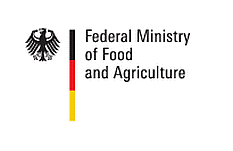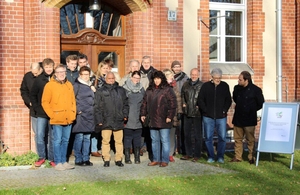EVA Workshop on wheat and barley
ECPGR Workshop for the establishment of a European Evaluation Network (EVA) on wheat and barley, 27-28 November 2018, Berlin, Germany
ECPGR facilitating the use of genetic resources: barley and wheat
A first step was made by ECPGR to firmly connect the conservation and the use of genetic resources in Europe and to join forces to address at a pre-competitive level the ever-changing threats to the European agriculture. The genetic diversity conserved in genebanks is one of the most sustainable and environmentally friendly resources that could be tapped to address old and new pathogens and climate change challenges.
A Private Public Partnership for the evaluation of genetic resources in Europe has made significant steps ahead in a meeting held 27-28 November 2018 at the Julius Kühn-Institute in Berlin, Germany.
The ECPGR Workshop for the establishment of a European Evaluation Network (EVA) on wheat and barley, sponsored by the German Federal Ministry for Food and Agriculture, gathered 20 experts from public institutions (genebanks and research centres from Bulgaria, Germany, Italy, Switzerland, United Kingdom) and private breeding companies (BASF, KWS, Limagrain, Nordic Seed, Syngenta). Under the coordination of the ECPGR Secretariat and based on the framework and principles of the EVA document (162,9 KB) recently endorsed by the ECPGR Steering Committee, the participants agreed to set up a collaboration aimed at evaluating European genetic resources of wheat and barley for resistance to the most relevant diseases. The approach intends to be systematic, aiming in the long-term to genotype and phenotype for disease resistance all the unique public domain germplasm conserved in Europe. The principles of the FAO International Treaty will be followed for the exchange of material and consequent access and benefit sharing. After multiplication at a single location, each accession will be tested in different environments with a maximum of 200 plots grown by each partner per crop every year. Crops involved in the testing will be spring and winter barley, spring and winter wheat and durum wheat in the southern region. The same evaluation protocols will be defined and used. The data obtained will be uploaded onto the EURISCO catalogue, being made available to the general public after a 3-year embargo, during which the data will be visible only to the partners.
Participants in the meeting were confident to find a sponsor that would cover some common costs, while the costs of the evaluation fields, data scoring and data exchange would be covered by the individual partners on their own budgets. According to agreed intentions, the initiative should start with the multiplication of the first batch of accessions already during next fall 2019. Additional partners, beyond those that were present in Berlin, will be welcome to join in the initiative.
Related Information
EVA Network - Wheat and Barley

and Agriculture for the period 2019-2027.


